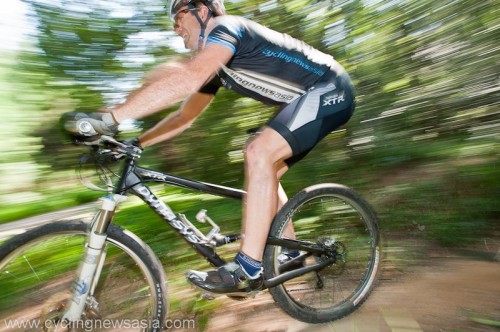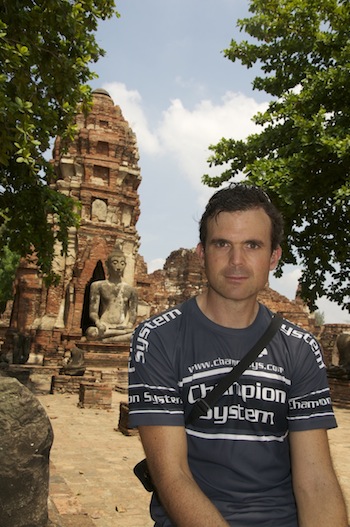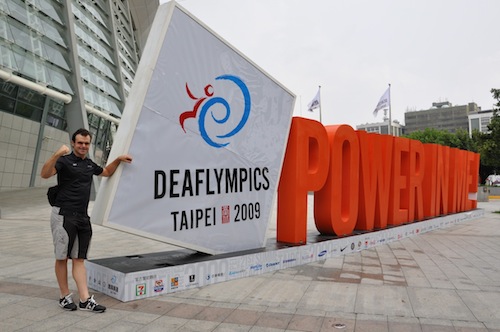 Have you ever wondered what it takes to travel around the world as a professional cyclist? Daniel Carruthers has been racing around the world for several years. Read on to find out how he combined his love of travel with his passion for biking.
Have you ever wondered what it takes to travel around the world as a professional cyclist? Daniel Carruthers has been racing around the world for several years. Read on to find out how he combined his love of travel with his passion for biking.
MSW: Hi Daniel. Thanks for being here today. Can you start by giving us a brief introduction to yourself?
DC: I’m a kiwi, married to a lovely Texan girl and currently live in Hangzhou, China. I am also over 80% deaf in both ears and require high powered Hansaton hearing aids to hear. I proudly represented New Zealand at the Deaflympics in Taiwan in 2009 and will be representing New Zealand again at the upcoming Tour de Formosa (30 October through 7th November) where Deaf Cyclists will be coming in from all over the world to race. I will also be going to Quebec, Canada next year to race in the World Deaf Cycling Championsships.
I currently work part-time for cyclingnewsasia.com as their business development manager and race editor as well as racing for the Hong Kong based Champion System Cycling Team. I am also working towards completing my PhD in Tourism at Zhejiang University. My field of interest is tourism and cycling. Eventually my aim is to work for Tourism New Zealand to help promote our beautiful country to Chinese people and the rest of Asia.
 I have travelled around the world, living in several countries including China, Taiwan, Israel, United States, St Helena Island and Kiribati. One of the most awesome places to visit in the world is St Helena Island. It’s a world away from this world and the only access is by Royal Mail Ship that takes 2 weeks from Wales or 6 days from Cape Town, South Africa. While living on this island, I compiled over 100 sketches of the island. I actually do sketches in various countries around the world and make some extra cash with them. I love drawing old character buildings which serve as an artistic diary as well as the normal photo taking. You can find me on Facebook or on Twitter at BikeDan.
I have travelled around the world, living in several countries including China, Taiwan, Israel, United States, St Helena Island and Kiribati. One of the most awesome places to visit in the world is St Helena Island. It’s a world away from this world and the only access is by Royal Mail Ship that takes 2 weeks from Wales or 6 days from Cape Town, South Africa. While living on this island, I compiled over 100 sketches of the island. I actually do sketches in various countries around the world and make some extra cash with them. I love drawing old character buildings which serve as an artistic diary as well as the normal photo taking. You can find me on Facebook or on Twitter at BikeDan.
MSW: Why did you decide to move to Asia?
DC: I first came to China in 2000 when my brother was working here and he convinced me to come and visit China before going to the UK to do a 2-year working holiday. I had my UK visa, but I ended up staying in China longer than I intended. I ended up doing a variety of work including working for a start-up dotcom company -Meetchina.com for six months. I worked as a model, taught English, and sought out investments for an investment company.
When I went back to China in 2001, my objective was to master Chinese, by no means an easy feat by someone who is profoundly Deaf. I went straight to Heilongjiang in the far Northeast of China and endured two cold freezing winters to study Chinese at Heilongjiang University. In 2003 I returned to New Zealand to start my Masters degree and I completed my research thesis on Sister City Relationships between Chinese and NZ cities, and their implications for tourism development. I spent 4 months in China in 2004 conducting my research in 23 Chinese cities that had Sister Relationships with NZ cities. I conducted the interviews myself in Mandarin and had them transcribed by a native speaking Chinese person. Since my previous research has been revolving around China, it made sense to come back in 2010 to embark on a PHD with the view of establishing myself as an expert on tourism in China and playing a role in marketing New Zealand as a tourism destination for ‘interactive travelers’. Furthermore, I really wanted to steer clear of the ‘mass tourism’ that seems to be going on with the Chinese tourists right now.
MSW: Please tell us a little about your experiences while studying abroad in China.
DC: I was in China from 2001-2003, where I was mostly focused on studying Chinese and passing an exam called HSK – the TOEFL equiliviant for Chinese language. I taught English on the side to pay for my tuition fees. I also bought a mountain bike for touring during the summer holidays, and I managed to save some money for travel. Prior to commencing my official studies at Heilongjiang University, I spent the summer in Macau teaching at the School of Nations summer camp where I was able to generate enough money to get set-up in China. As I was single back then, I had plenty of attention from Chinese girls at the university, and thus numerous opportunities to practice my mandarin on dates…

MSW: What brought you to Taiwan?
DC: Initially I came to Taiwan to participate in the 2009 Deaflympics held in Taipei. It was a fantastic event, the biggest one Taiwan has ever held with 5,000 athletes in attendance and stadiums full of crowds. Taipei at that time was simply buzzing with the Games.
My wife and I had recently gotten married (July 4th 2009) and had planned to stay in Taiwan once the Deaflympics were over. We stayed for six months and thoroughly enjoyed our Taiwan experience. We still miss it and would love to have an opportunity to go back and live there. During our stay in Taiwan, we taught business English and I got to check out a lot of the amazing cycling tours in and around Taipei. I called it a “cyclist paradise”. You can visit my blog to find out why.
MSW: You’ve recently moved back to China. What prompted you to move back to the China? How does life in China compare to life in Taiwan?
DC: I moved back to China as I am enrolled in a PhD program under a scholarship from the China Government. This was also planned before we came to Taiwan and since my research area is specific to China while also being able to speak, read and write Mandarin, well, it makes sense to further my education in China. My topic area for my PhD is going to be cycle tourism.
Life in China is actually very different to Taiwan. It was easier living in Taipei. We lived in Shida, where there are plenty of nice food choices at good prices. It’s more expensive to eat good food here in China. Regular Chinese food is good, but I get sick of it – it’s the same everywhere and it’s very oily.
Getting things done in China always seems to take longer. Things seemed more efficient and stream-lined in Taiwan. More people speak English in Taiwan and you can get around there without having to know too much Chinese. But here in China, it is almost essential to master basic Mandarin if you want to get around. Not many people speak English unless you are living near a university campus where most students know some English.
One big disadvantage about living in China is that you have to cope with the pollution levels in the cities. Where we are in Hangzhou is good by Chinese standards, but still no where as good as Taipei with its clean air and surrounding mountains (Yes, Taipei traffic with all its scooters can be very dirty, but overall the air quality is still better in Taiwan). However, there are still some absolutely stunning places to be found in China that can surpass Taiwan. Once you are out of the cities proper and into the country side, the air quality is noticeably better. A good example is Moganshan, a beautiful mountain area 55km outside of Hangzhou with pristine scenery and clear skies.
China is like a wild frontier. It can be quite exciting here. Lots of opportunities are cropping up and you can do quite well if you are prepared to learn the language and can tolerate inconveniences such as traffic, pollution and the way people do things. I will be in China for several years, but we will not be settling here forever. We’ll likely settle down somewhere else in Asia like Singapore or Taiwan. Maybe we’ll go back to live in New Zealand. I miss my own country at times, we have a beautiful land down-under.
MSW: In the past year, you’ve forged ahead with several online projects. Please tell us about your web sites and your goals for them.
DC: I have several online projects yes, but not all are actually live online yet. My main one is the www.danielcarruthers.com website where I aim to bring my readers the cycling adventures and racing I experience, provide some product reviews and top cycling tips for people who are new and just starting out with cycling. I am working on getting a website up and running that will cover popular cycling locations throughout Asia and the Pacific region. This will be an informative website that will detail maps, places to stay, what to see, where to cycle etc.
MSW: You’ve written about some truly amazing rides in the past few years. Which journey first comes to mind when you think about all the rides that you have done in Asia?
DC: I’ve had a couple of epic rides in China, but my favorite ride is probably cycling in Qinghai. It was an amazing time there with all the mind-blowing cycling that can be had at altitude. I was there in July covering the Tour de Qinghai Lake race for cyclingnewsasia and after every stage I would go riding. I even went riding with some cycling legends including Mike Carter, who has done all the Grand Tours and is the current 45-50 age group World Champion. I learned a lot from these riders. I am just chomping at the bit to get back to Qinghai again in the future to do more road riding. I recently wrote a 3-part series on Qinghai so if you are interested in checking this place out, take a look at my website for photos.
Another amazing place would be the route from Zhongdian, Yunnan through the back route to Litang in Sichuan and on to Chengdu. I did this in 2002, and things did not go all to plan. So this is a route I dearly would love to do again. It is a cycle touring route and not really suitable for road bikes.
In Taiwan, Sun Moon Lake struck me as a awesome place to ride as well as the East Coast of Taiwan. The Taipei City area has numerous riding opportunities and you can spend countless hours exploring and never go over the same road twice. Favourite areas in Taipei include the Wulai gorge, Jinshan and over the mountain back to Taipei and the Danshui area.
MSW: If someone were to consider touring a country by bicycle, what are some tips that you would offer to help them prepare for their journey?
DC: My number one tip for cycle touring is to try to travel as light as possible. As preparation for the journey, it is recommended that you do a couple of short trips over 2 or 3 days to see how your body copes with riding for up to 8 hours each day. You will want to put in an adequate level of training so that you do not get too fatigued during the touring trip – you want to enjoy the scenery and take lots of photos.
Make sure you have a good sturdy bike that will not fall apart and ensure that you have the bike fitted to you correctly. Invest in some good waterproof panniers (I just use rear panniers) and have a handle-bar bag that would be sufficient to hold your camera, maps, snack food, and your passport/wallet.
It is a good idea to split up your day into manageable chunks of time. For example, be on the road by 7am or earlier and ride for 3-4 hours before stopping for lunch. Break for one hour and continue riding for another 2-3hrs. Take a 30min break for afternoon tea and then ride till just before sundown and either pitch your tent or find accommodation.
Always ensure you are drinking and eating enough throughout the day to keep your energy levels up.
MSW: Could you provide us with links to some of your favorite travel tales?
DC: Some of my favorite traveling tales include Riding with the Wife Part One and Riding With the Wife Part Two. This article on Tian Mu Mountain in China is also an entertaining read.

Canadian expat Carrie Kellenberger has kept a home base with her husband in Asia since 2003. A prolific traveler, Carrie has funded her travels primarily as a writer, editor, travel blogger and photographer, but she has also worked as an educator, voice over artist, model and nightclub singer. She draws upon her 15+ years of travel experience to write about travel-related issues and the countries she has visited on her award-winning web site, My Several Worlds.
Her photography and travel articles have appeared in both print and online publications around the world, including Travel and Leisure Asia, Unearthing Asia and Hip Compass Escapes.








